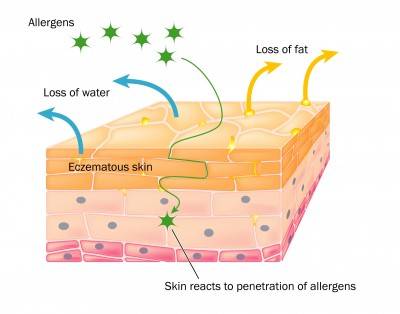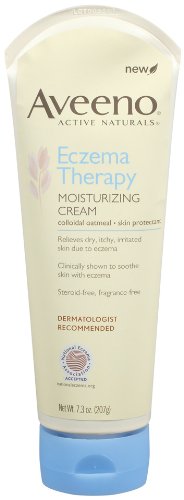The exact cause of eczema is somewhat a mystery to doctors, but it is generally thought to be hereditary. Therefore, if you suspect you are suffering from eczema the doctor will firstly investigate your family’s previous medical history.

Causes:
Allergies and Asthma
Asthma has affected eczema sufferers for years and so countless amounts of research went into the discovery of why the link was apparent. Studies show that the damaged skin produces thymic stromal lymphopoietin (TSLP) in the lungs of eczema sufferers, which is a substance known to trigger asthma. The ‘atopic march’ as it is more commonly known is the link between eczema, allergies and asthma and researchers are currently looking into finding a way to stop the inflamed skin from producing TSLP, which could minimise chances for eczema sufferers to contract asthma.
Furthermore, the immune system is generally at the core of these conditions and even though it may not be curable it is certainly is treatable. Finding out what triggers the inflammatory response to your rash and itching is the key to a successful treatment. Prepare yourself to undergo numerous allergy tests, as this may determine what is triggering the irritation.
Relieving the Itching
 The first goal in treating eczema is to relieve the itching. The itching is both annoying and can lead to infections due to skin exposure. As the skin is dry and inflamed you will be required to:
The first goal in treating eczema is to relieve the itching. The itching is both annoying and can lead to infections due to skin exposure. As the skin is dry and inflamed you will be required to:
- Moisturise with a non-perfumed cream or lotion
- Use a cold compress to reduce inflammation
Your practitioner may prescribe medication to you but dependent on the severity of your case over-the-counter products may be a better and cheaper option. The prescribed medications usually have corticosteroids in them and they work by reducing the inflammation of your skin.
Editor’s Note: The Aveeno Eczema Therapy Moisturizing Cream pictured is one of a range of suitable moisturizing products which are available at great value prices at Amazon.
Other Treatments
If the you feel the above does nothing to relieve the irritation then other treatments are available. Shown below are a few examples you may wish to discuss with your skin doctor:
- Antihistamines
- Tar Treatments
- Ultraviolet Light Therapy
- Drugs (Cyclosporine)
As everyone reacts differently to medication, you may have to try several forms before you and your private GP find out which one works best as skin treatment. There are also ways in which you can reduce the irritation of the condition.